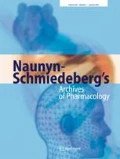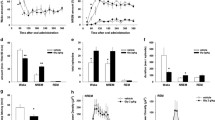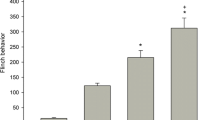Abstract
This study examined the effects of acute and chronic desipramine, 24-h total sleep deprivation (TSD) and 96-h REM sleep deprivation (REMSD) on physostigmine-induced hypothermia, analgesia and behaviour. The effects of acute and chronic desipramine treatment on oxotremorine-induced hypothermia were also examined. Intraperitoneal administration of physostigmine (0.5 mg/kg i.p.) induced hypothermia, analgesia, purposeless chewing movements (chewing) and head tremors. While atropine given in a low dose (1.0 mg/kg i.p. 15 min prior) did not antagonize the hypothermia, chewing and head tremor associated with physostigmine (0.5 mg/kg i.p.), a higher dose of atropine (10 mg/kg i.p. 15 min prior) decreased physostigmine-induced hypothermia, chewing and head tremor behaviour.
Chronic (10 or 20 mg/kg i.p. daily for 10 days and withdrawn 24 h prior, chronic DMI) and acute (10 mg/kg, i.p. + 60 min prior, acute DMI) desipramine treatments abolished physostigmine (0.5 mg/kg i.p.)-induced hypothermia compared with saline pretreatment. Interestingly atropine (1 mg/kg i.p. 15 min prior) reversed the inhibitory effect of chronic DMI on hypothermia induced by physostigmine. Acute but not chronic DMI decreased physostigmine-induced chewing and head tremor behaviour. Atropine (1 mg/kg i.p. 15 min prior) increased the inhibitory action of acute DMI on physostigmine-induced chewing behaviour. Acute DMI (10 mg/kg i.p.) decreased oxotremorine (0.1 mg/kg i.p.)-induced hypothermia, while chronic DMI increased the hypothermic effect of oxotremorine. TSD and REMSD did not alter physostigmine (0.5 mg/kg i.p.)-induced hypothermia; however, REMSD and stress decreased physostigmine-induced analgesia and chewing.
It is suggested that chronic desipramine treatment decreased physostigmine-induced hypothermia by causing hypersensitivity of pre-synaptic muscarinic receptors, whereas acute desipramine decreased the sensitivity of post-synaptic muscarinic receptors



Similar content being viewed by others
References
Batra S, Bjorklund A (1986) Binding affinities of antidepressant tricyclic drugs to muscarinic cholinergic receptors in human parotid gland. Psychopharmacology 90:1–4
Brunello N, Barbaccia ML, Chuang DM, Costa E (1982) Down regulation of beta-adrenergic receptors following repeated injections of desmethylimipramine. Permissive role of serotonergic axons. Neuropharmacology 21:1145–1149
Buckett WR (1979) Peripheral stimulation in mice induces short-duration analgesia preventable by naloxone. Eur J Pharmacol 58:169–178
Carroll BJ, Frazer A, Schless A, Mendels J (1973) Cholinergic reversal of manic symptoms. Lancet 1973:427–428
Dill RE (1977) Induction and measurement of tremor and other dyskinesias. In: Myers RD (ed) Methods in psychobiology. Academic Press, New York, pp 241–257
Dilsaver SC (1986) Cholinergic mechanisms in depression. Brain Res Rev 11:285–316
Elsenga S, Van Den Hoofdakker RH (1987) Response to total sleep deprivation and clomipramine in endogenous depression. J Psychiatr Res 21:157–161
Friedman MJ, Jaffe JH (1969) A central hypothermic response to pilocarpine in the mouse. J Pharmacol Exp Ther 167:34–44
Goldman ME, Erickson CK (1983) Effects of acute and chronic administration of antidepressant drugs on the central cholinergic nervous system: comparison with anticholinergic drugs. Neuropharmacology 22:1215–1222
Goyal RK (1989) Muscarinic receptor subtypes physiology and clinical implication. N Engl J Med 321:1022–1029
Heiser JF, Wilbert DE (1974) Reversal of delirium induced by tricyclic antidepressant drugs with physostigmine. Am J Psychiatry 131:1275–1277
Hicks RA, Okuda A, Thomsen D (1977) Depriving rats of REM sleep: the identification of a methodological problem. Am J Physiol 90:95–102
Hochli D, Riemann D, Zulley J, Berger M (1986) Is there a relationship between response to total sleep deprivation and efficacy of clomipramine treatment in depressed patients. Acta Psychiatr Scand 74:190–192
Janowsky DS, el-Yousef K, Davis JM, Sekerke HJ (1973) Parasympathetic suppression of manic symptoms by physostigmine. Arch Gen Psychiatry 28:542–547
Jones RSG (1980) Enhancement of 5-hydroxyptamine-induced behavioural effects following chronic administration of antidepressant drugs. Psychopharmacology 69:307–311
Karczmar AG (1967) Pharmacologic, toxicologic and therapeutic properties of anticholinesterase agents. In: Roots WS, Hofmann FG (eds) Physiological pharmacology. Academic Press, New York, pp 167–322
Kilbinger H (1984) Pre-synaptic muscarinic receptors modulating acetylcholine release. Trends Pharmacol Sci 5:103–105
Lomax P, Foster RS, Kirkpatrick WE (1969) Cholinergic and adrenergic interactions in the thermoregulatory centres of the rat. Brain Res 15:431–438
Mendelson WB, Guthrie RD, Frederick G, Wyatt RJ (1974) The flowerpot technique of rapid eye movement (REM) sleep deprivation. Pharmacol Biochem Behav 2:553–556
Mogilnicka E, Wedzony K, Klimek V, Czyrak A (1986) Desipramine induces yawning behaviour in rats. Neuropharmacology 25:783–786
Overstreet DH, Kozar MP, Lynch GS (1973) Reduced hypothermic effects of cholinomimetic agents following chronic anticholinesterase treatment. Neuropharmacology 12:1017–1032
Rehavi M, Maayani S, Sokolovsky M (1977) Tricyclic antidepressants as antimuscarinic drugs: in-vivo and in-vitro studies. Biochem Pharmacol 26:1559–1567
Risch S (1982) β-endorphin hyper-secretion in depression; possible cholinergic mechanisms. Biol Psychiatry 17:1071–1079
Rupreht J, Dzoljic MR (1983) The role of a noradrenergic system in the antinociceptive effects of 4-aminopyridine in the rat. Arch Int Pharmacodyn Ther 265:203–210
Severson JA, Anderson B (1986) Chronic antidepressant treatment and mouse brain 3H-Imipramine binding. J Neurosci Res 16:429–438
Slovis TL, Ott JE, Teitebaum DT, Lipscomb W (1971) Physostigmine therapy in acute tricyclic antidepressant poisoning. Clin Toxicol 4:451–459
Snyder BD, Blonde L, McWhirter WR (1974) Reversal of amitryptiline intoxication by physostigmine. J Am Med Assoc 230:1433–1434
Spencer PS (1965) Activity of centrally acting and other drugs against tremor and hypothermia induced in mice by tremorine. Br J Pharmacol 25:442–455
Sternthal HS, Webb WB (1986) Sleep deprivation of rats by punitive and non-punitive procedures. Physiol Behav 37:249–252
Tsuchiya K, Toru M, Kobayashi T (1969) Sleep deprivation: changes of monoamine and acetylcholine. Life Sci 8:867–873
Ukponmwan OE, Ruphret J, Dzoljic MR (1986) An analgesic effect of enkephalinase inhibition is modulated by monoamine oxidase B and REM sleep deprivation. Naunyn-Schmiedebergs Arch Pharmacol 322:376–379
Vogel GW, Vogel F, McAbee RS, Thurmond AJ (1980) Improvement of depression by REM sleep deprivation: new findings and theory. Arch Gen Psychiatry 37:247–253
Wessler I (1992) Acetylcholine at motor nerves storage, release and pre-synaptic modulation by autoreceptors and adrenoceptor. Int Rev Neurobiol 34:283–284
Wirz-Justice A, Puhringer W, Hole G (1979) Response to sleep deprivation as a predictor of therapeutic result antidepressant drugs. Am J Psychiatry 136:1222–1223
Acknowledgements
Desipramine was donated by Novartis BV (Arnhem, The Netherlands). We thank Mrs. M. Sanusi for her secretarial work.
Author information
Authors and Affiliations
Corresponding author
Rights and permissions
About this article
Cite this article
Murugaiah, K.D., Ukponmwan, O.E. Functional reactivity of central cholinergic systems following desipramine treatments and sleep deprivation. Naunyn-Schmiedeberg's Arch Pharmacol 368, 294–300 (2003). https://doi.org/10.1007/s00210-003-0784-6
Received:
Accepted:
Published:
Issue Date:
DOI: https://doi.org/10.1007/s00210-003-0784-6




